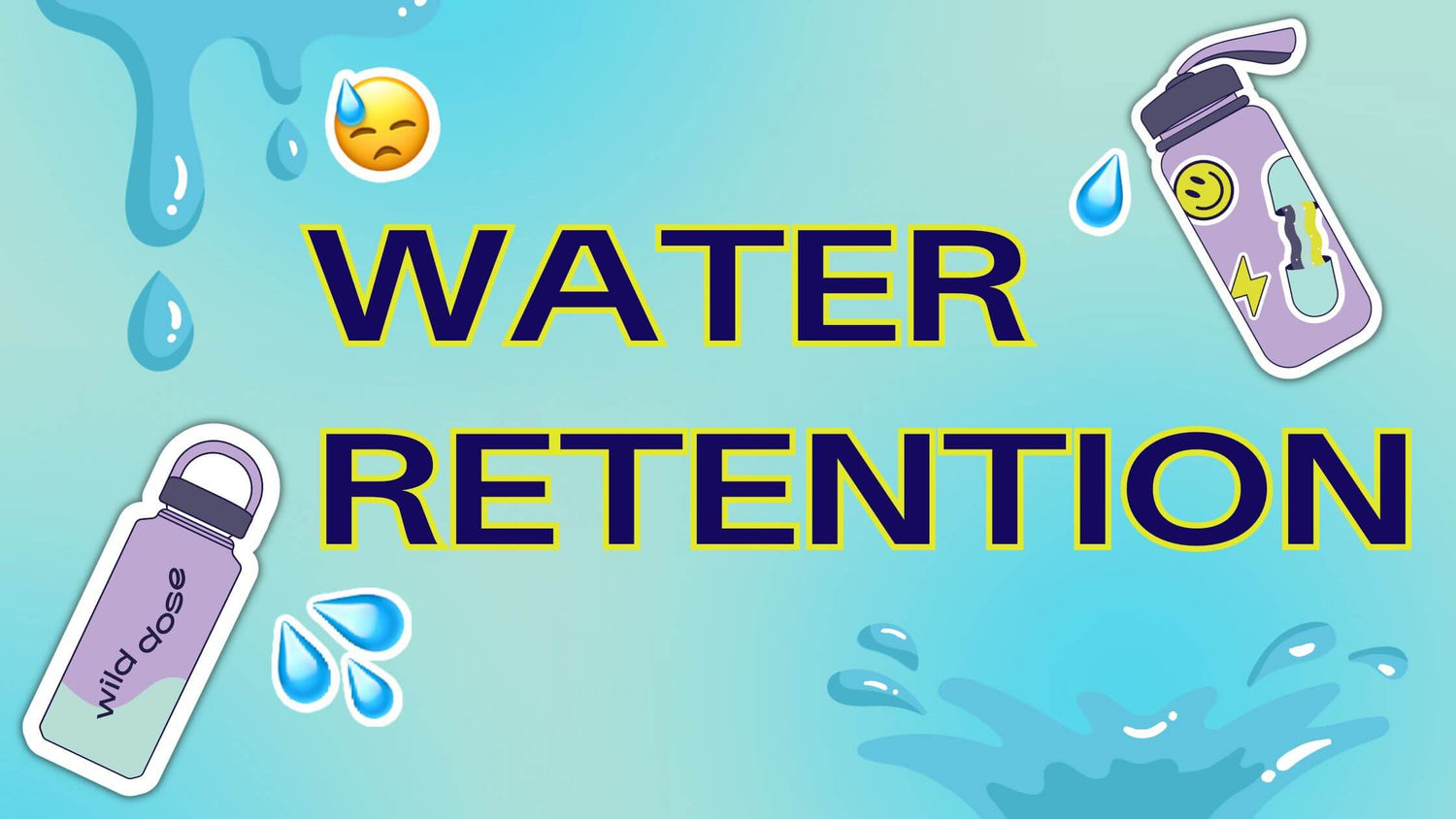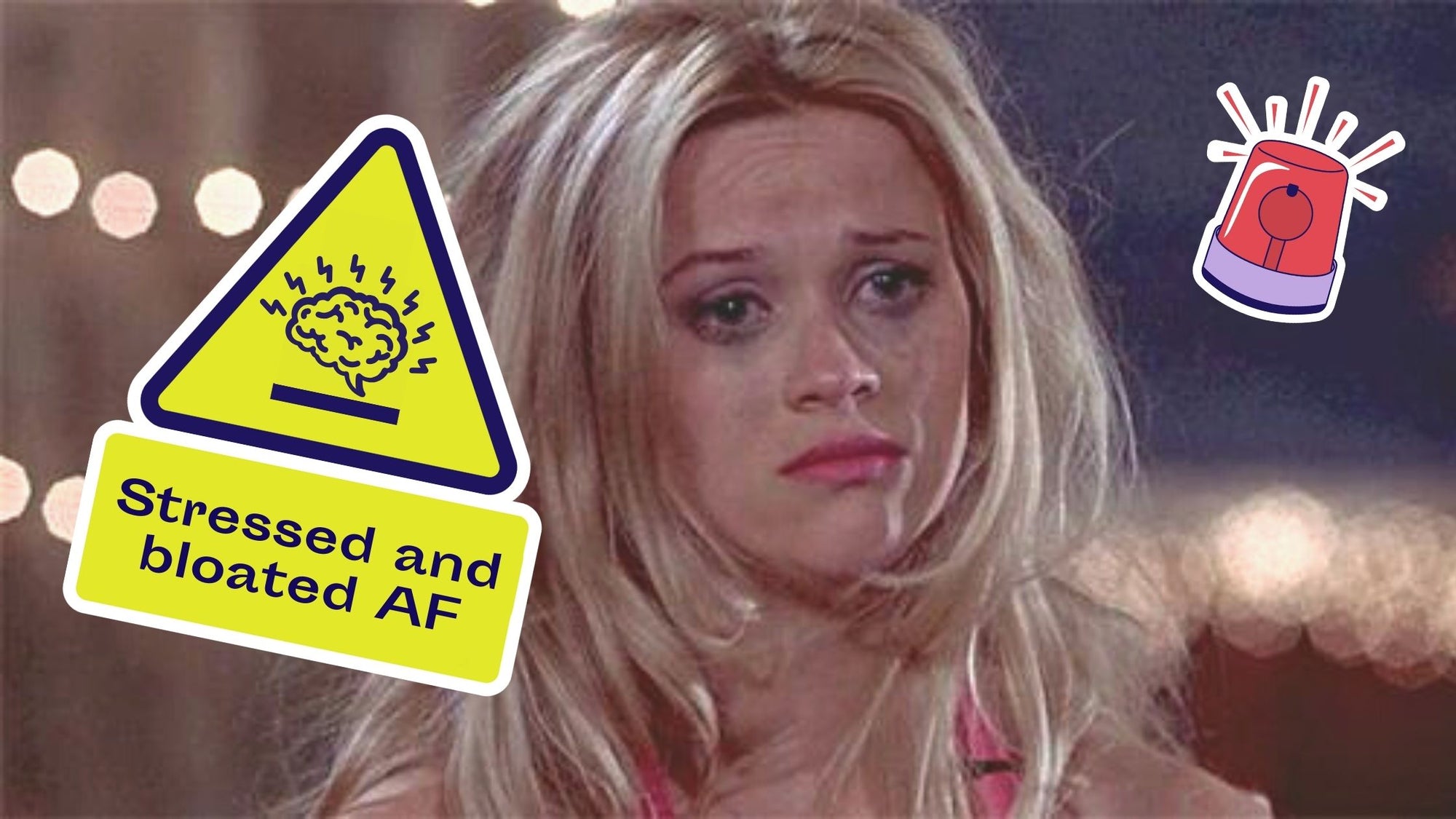What Is Water Retention?
You’ve probably heard the term water retention before. It’s often used synonymously with bloating or puffiness.
A small amount of water retention isn’t generally a problem, and it’s often caused by completely normal and expected things, such as the menstrual cycle (period), long-haul travelling, and temporary changes in your diet.
However, significant swelling and bloating can cause negative side effects. Not only is it uncomfortable to deal with, but it can lead to stiffness, tightness, shortness of breath, and headaches. Your risk of certain medical problems, such as hypertension (high blood pressure), also increases when you have a high amount of water retention in your body.
In this article, we’re going to discuss what water retention is, its causes, signs and symptoms, and what you can do to tackle it. Let’s get into it!
What Is Water Retention?
Water retention, which is medically known as oedema, refers to the accumulation of fluid in the body’s tissues. It leads to puffiness and a swollen appearance of the affected tissues.
You can get water retention in lots of different parts of your body, with the most commonly affected being the limbs (hands, lower legs, ankles, and feet). There are lots of reasons why you might experience water retention throughout your body, and we will discuss these in the next section, so keep reading!
What Causes Water Retention?
Anybody can experience water retention at any age. Even if you’re relatively healthy, you might have some bloating and puffiness.
For most people, water retention is temporary and can be reversed quickly. However, if you have a chronic medical condition that impacts fluid regulation and movement in your body, you might be prone to ongoing oedema. In some cases, doctors might recommend you take medications to keep your swelling in check.
Short-term causes of water retention include:
- Hormonal fluctuations caused by menstruation or pregnancy
- Going through the menopause
- Hormonal changes during periods of high stress
- Dehydration
- Hot weather (causing dehydration)
- High-intensity exercise (again, leading to reduced hydration)
- Reduced dietary protein intake
- Increased dietary salt intake
- Increased alcohol consumption
- Standing up for long periods of time (this usually causes lower leg, ankle, and foot oedema specifically)
- Sitting down for a long time, such as when you’re travelling on holiday
- Injury or trauma, causing an inflammatory response in the body
- Allergic reactions or insect bites, again causing increased inflammation
- Medications, including hypertensives, such as calcium channel blockers, non-steroidal anti-inflammatory drugs (NSAIDs), and corticosteroids
Causes of long-term oedema include chronic health conditions that impact blood circulation and fluid movement throughout the body. These include cardiovascular conditions, such as high blood pressure and congestive heart failure, and chronic kidney disease.
What Are the Signs of Water Retention?
Water retention is usually visibly noticeable, especially as its severity increases. It appears as bloating, swelling, and puffiness under the skin.
Sometimes, you can experience something called pitting oedema, where an indentation remains on the skin when you lightly press it. This type of oedema may cause the skin to have several small dents across the swollen areas. Although it can impact any part of your body, you’re most likely to experience pitting oedema in your lower legs and ankles.
The main signs and symptoms of water retention include:
- Swelling
- Bloating in the abdomen
- Puffiness
- Weight gain due to the accumulation of fluids in the body
- Putting oedema
- Changes in the colour of the skin usually increased redness or a purple hue across the surface of the skin
- A feeling of tightness under the skin
- Stiffness around the joints
- Shortness of breath
- High blood pressure
What Are Some Natural Remedies for Water Retention?
If you currently have a lot of water retention in your body, for whatever reason, you might be searching for some natural remedies for bloating and puffiness.
Of course, there will be some specific actions you need to take to tackle your water retention if it’s caused by a unique medical condition. However, there is a wide range of things you can do at home to tackle your symptoms quickly and easily. These include lifestyle changes, dietary adjustments, and more.
1. Keep your hormones in check
As we mentioned above, hormonal bloating is a thing. A big thing that impacts millions of menstruating women across the world. While it’s completely healthy and desirable to have a regular menstrual cycle dictated by natural fluctuations in reproductive hormones, these changes in hormones throughout the month can cause changes in fluid balance.
A lot of women find that they feel more bloated and puffier in the days leading up to their period, and this tends to continue throughout their monthly bleed until a new menstrual cycle begins. You can thank oestrogen and progesterone for this, hormones that slow down digestion and increase water retention in the abdomen.
These hormones are essential, not just for your fertility but for the health of your brain, heart, and bones. So, as much as you’d probably love to get rid of them and not have to deal with a nasty period, it’s a blessing in disguise. Plus, taking steps to keep your hormones well-balanced can reduce the negative symptoms of your menstrual cycle, including water retention and bloating.
To keep your hormones balanced, make sure you maintain a healthy weight, exercise regularly (but not too much, as overdoing it can actually have the opposite effect), minimise your psychological stress as much as possible, fuel your body with all of the essential macronutrients and micronutrients it needs.
2. Manage your chronic medical conditions
If your oedema is secondary to a long-term medical condition, such as hypertension, heart disease, or diabetes, it’s essential that you manage your condition properly to minimise water retention.
The best way to manage your long-term health condition depends on the diagnosis. The way you manage cardiovascular disease is completely different to how you’d manage diabetes.
You can work with a qualified healthcare team to help manage your condition in the best way. You might need to take certain medications, if recommended by your doctor, or make changes to your lifestyle and diet to keep everything in check and avoid oedema.
3. Stay hydrated throughout the day
Dehydration is one of the most common causes of temporary water retention, which might sounds a little backwards. After all, if there isn’t enough water in your body, why is there an excess of fluid in the places it shouldn’t be (i.e., in the tissues)?
However, dehydration can disrupt the natural movement of fluid between your tissues and blood vessels. In turn, this causes bloating and puffiness that will only disappear when you hydrate your body adequately.
Thankfully, the resolution to dehydration-related water retention is simple. Drink more liquids! Avoid getting too thirsty, and make sure to continually hydrate yourself throughout the day.
4. Take a probiotic and digestive enzyme supplement
Healthy digestion relies on the presence of probiotic bacteria and digestive enzymes in the small and large intestines. Probiotic bacteria help break down ingested food and produce vitamin K and short-chain fatty acids (SCFAs), which are essential for your health.
Digestive enzymes, including amylase, lipases, and proteases, are produced by your mouth, stomach, small intestines, and pancreas. They emulsify (break down) the foods you eat into smaller pieces that can easily pass through the intestinal wall into the bloodstream.
Probiotic species of bacteria, including Lactobacillus and Bifidobacterium, reside in their millions inside your colon (gut), and your body produces digestive enzymes naturally. However, you can support your digestion and relieve bloating by taking a supplement that contains both probiotics and digestive enzymes.
5. Try natural bloating remedies in foods
There are lots of foods and ingredients that do a great job of reducing water retention and bloating. Including more of these foods in your diet is a simple and effective way to rid yourself of oedema, no matter what has caused it.
Here are some beneficial bloat-relieving foods to add to your meals and snacks:
- Ginger - an adaptogen that can speed up digestion to reduce the risk of abdominal bloating and constipation. You can add ginger to your recipes when baking, sprinkle it onto yoghurt or pancakes, or stir it into hot tea.
- Turmeric - another spice that is amazing for reducing inflammation and water retention. You can stir turmeric into cakes, cookies, and pancakes when baking, or add it to your smoothies and hot drinks to experience its bloat-relieving benefits.
- Garlic - an extremely beneficial vegetable that can reduce inflammation and support digestion to tackle water retention and digestive symptoms. Add a clove of garlic to your curry, chilli, stir fry, pasta, fajitas, and soup dishes.
- Bananas - thanks to the high potassium content of bananas, they can help with fluid regulation and balance in the body. They also provide prebiotic fibres that fuel the probiotic bacteria in your gut to support digestion. Chop a banana onto your cereal, yoghurt, and pancakes, or include it in your cake, cookie, brownie, or smoothie recipes.
- Lemon - a tangy fruit that can boost digestive health and reduce bloating, gas production, and water retention. You can squeeze lemon juice into water, hot tea, smoothies, and dinner recipes.
6. Increase your potassium intake
Water retention can result from specific dietary choices. If your diet lacks potassium, you’re more prone to bloating and swelling because of potassium’s essential role (alongside sodium) in fluid balance within the body.
Adding potassium-rich foods to your diet can minimise water retention and improve your overall health. Foods that are abundant in potassium include avocados, bananas, broccoli, dried fruit, lentils, potatoes, and spinach.
At the same time as increasing your potassium intake, you might want to consider reducing your sodium consumption. We recommend cutting back on your intake of processed foods and junk foods if you’re someone who usually enjoys a lot of these foods, as they’re high in sodium and could contribute to dehydration, bloating, and oedema.
With that being said, if you consume a very healthy diet and rarely indulge in takeaways or highly processed, packaged foods, you might not need to worry about reducing your sodium intake. In fact, many people who eat a junk food-free diet don’t take in enough sodium, which can be just as detrimental as a lack of potassium.
7. Stay physically active
A sedentary lifestyle can increase the risk and severity of digestive issues and oedema. Physical movement encourages fluids to move around your body as they should, preventing blood and water from accumulating in places it shouldn’t (such as in the tissues). Of course, exercise is also a vital component of a healthy lifestyle and supports your physical and emotional well-being.
You don’t need to go overboard and exercise for hours and hours a day to stay healthy. The general recommendation is around 150 minutes of moderate intensity exercise a week for maximum health benefits, and this can be any form of exercise. You could become a member at a local gym and lift weights, join a running club, start dance classes, or play sports with other people in your community. Even walking throughout the day and increasing your step count could do the trick.
Once you start adding more exercise into your routine, you should notice that your bloating and water retention reduce or even disappear (unless there is another thing causing water retention, aside from being sedentary).
8. Tackle Water Retention One Capsule at a Time
Are you ready to start implementing the above natural remedies into your daily routine? Don’t forget to head over to our product page to learn more about our supplement, A Dose For Bloating. You can tackle your digestive issues and water retention one capsule at a time until your symptoms fully resolve!









